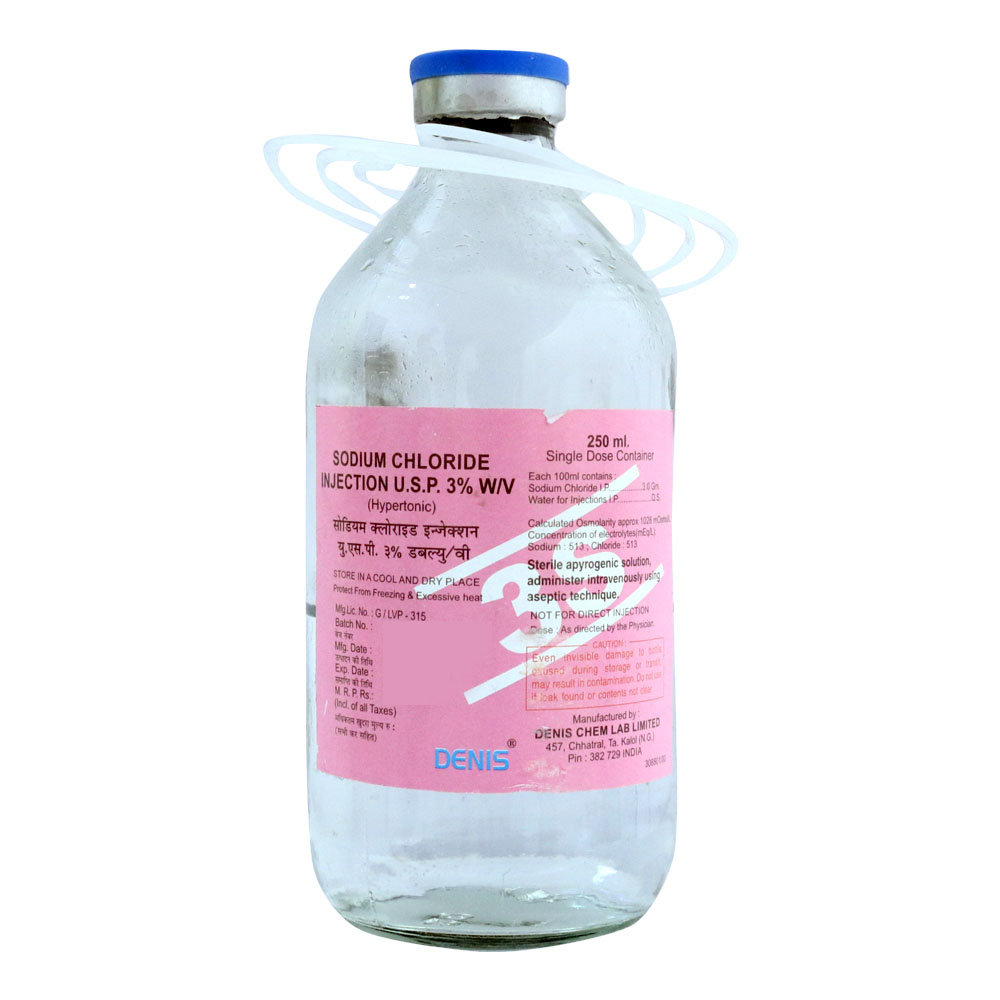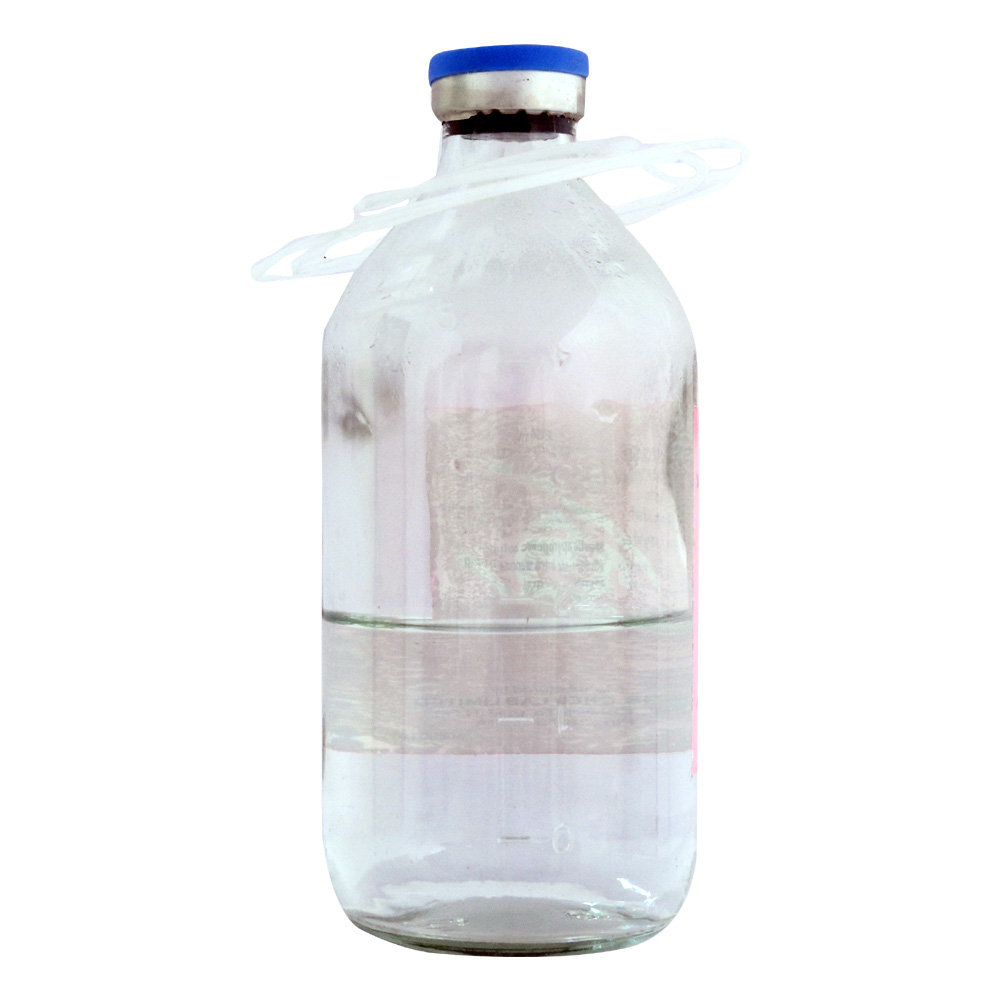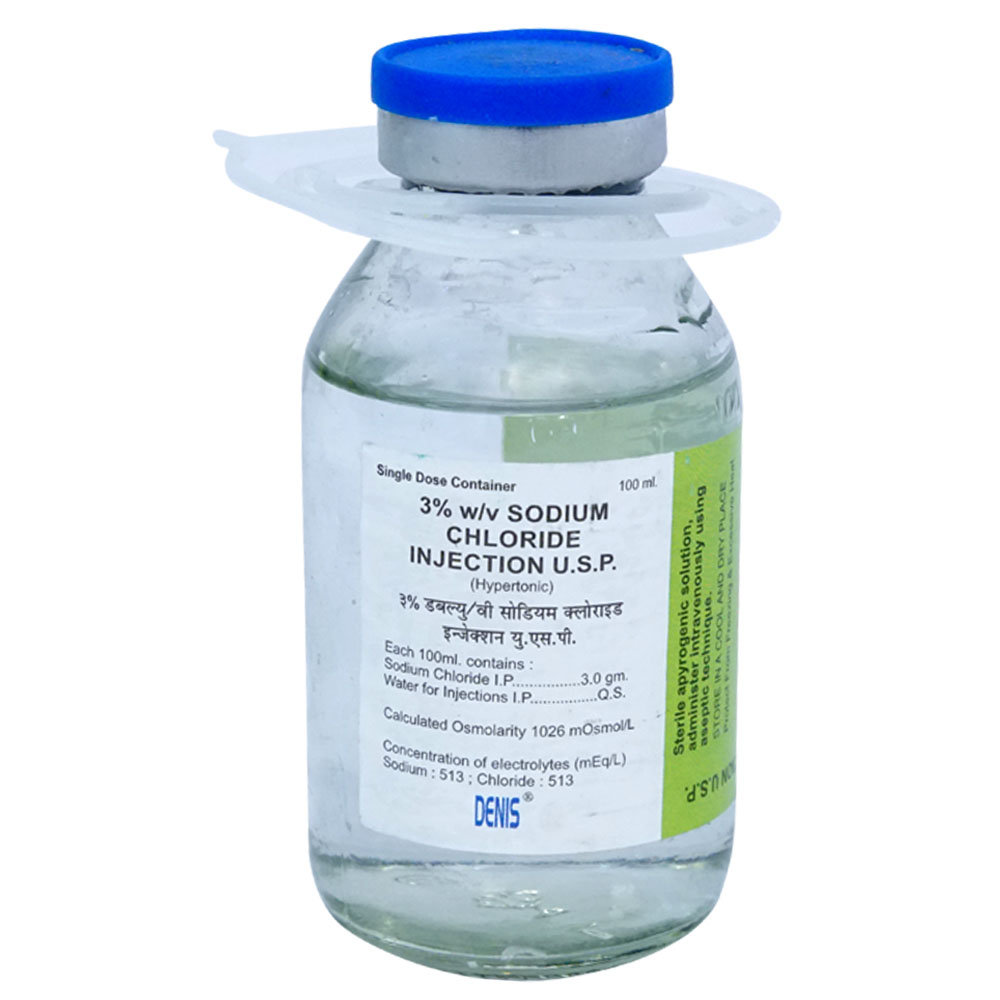Sodium Chloride 3% Injection 250 ml
MRP ₹181.5
(Inclusive of all Taxes)
₹27.2 Cashback (15%)
Provide Delivery Location
Online payment accepted
 Prescription drug
Prescription drugWhats That
Composition :
Manufacturer/Marketer :
Consume Type :
Expires on or after :
Return Policy :
About Sodium Chloride 3% Injection
Sodium Chloride 3% Injection is indicated for the extracellular fluid replacement, parenteral replenishment of fluid and sodium chloride as required by the patient’s clinical condition, and treatment of metabolic acidosis in the presence of fluid loss. It helps prevent and treat salt and fluid imbalances in the body.
Sodium Chloride 3% Injection contains Sodium chloride that helps maintain the balance of fluid in and around the body’s cells and tissues. It aids in the restoration of the normal salt balance. Sodium Chloride 3% Injection acts as a source of electrolytes and water for hydration.
In some cases, Sodium Chloride 3% Injection may cause injection site reactions such as irritation, swelling, tenderness, and redness. Most of these side effects do not require medical attention and will resolve gradually over time. However, you are advised to talk to your doctor if the side effects persist or worsen.
Tell your doctor if you are allergic to any components in Sodium Chloride 3% Injection . Consult your doctor if you are pregnant or breastfeeding. Keep your doctor informed about your health condition and medications. Please consult your doctor if you have any concerns regarding the usage of Sodium Chloride 3% Injection in children.
Uses of Sodium Chloride 3% Injection
Directions for Use
Key Benefits
Sodium Chloride 3% Injection is indicated for the extracellular fluid replacement, parenteral replenishment of fluid and sodium chloride as required by the patient’s clinical condition, and treatment of metabolic acidosis in the presence of fluid loss. It helps prevent and treat salt and fluid imbalances in the body. Sodium Chloride 3% Injection helps maintain the balance of fluid in and around the body’s cells and tissues. It aids in the restoration of the normal salt balance. Sodium Chloride 3% Injection acts as a source of electrolytes and water for hydration. Sodium chloride may be used to dilute or prepare some drugs for use and irrigation (wash out wounds).
Storage
- Heart failure needs immediate medical attention. To manage this effect, the doctor's instructions must be followed strictly.
- Take care of change in your weight as there can be sudden changes.
- Rest and refrain from physical activity, and restart after a few days.
- Reduce your salt intake and control your diet with the help of a dietician.
- Track your symptoms and keep your follow-up appointments to manage severe side effects.
- Inform your doctor about your blood clotting disorder for proper diagnosis and treatment.
- Avoid unusual clotting by following your physician's prescription for medications.
- Do not stand or sit for extended periods of time.
- Regular workouts help one to enhance circulation and lower blood clot danger.
- Give up smoking to better your health.
- Maintain a healthy weight to reduce pressure on veins and lower blood clot risk.
- If you have symptoms such as pain, swelling, redness, or warmth in your veins after taking medication, contact your doctor right once. Share information about your symptoms, medication regimen, and medical history.
- Your doctor will then assess your medication regimen to determine if it's contributing to the thrombophlebitis. This assessment will help identify the best course of action to manage your condition and prevent further complications.
- Your doctor may suggest certain diet and lifestyle changes to help manage your condition. This may include increasing your intake of foods rich in omega-3 fatty acids, staying hydrated, exercising regularly, and maintaining a healthy weight. Your doctor may also advise medications to reduce inflammation, prevent blood clots, or manage pain if necessary.
- If your condition does not improve or persists, consult your doctor and report your condition. Your doctor will assess your progress, adjust your treatment plan if necessary, and provide appropriate advice to ensure the best possible outcome.
- Injection site reaction can include numbness or redness.
- Get a physical examination, follow your doctor's instructions, if it worsens or gets swollen.
- Apply cold compress for pain relief.
- Practice good hygiene and keep the injection site away from heat and pressure.
- Your doctor may stop or adjust the dose of your medication that might be causing fluid buildup and may prescribe diuretics to help remove extra fluid.
- Limit your intake of salt and monitor how much fluid you drink regularly.
- Regularly check your weight and blood pressure, and keep track of your urine output to see how your condition is improving.
- Stay at a healthy weight, drink alcohol in moderation, limit caffeine intake, and quit smoking to help prevent your symptoms from getting worse.
- Exercise regularly, get enough sleep, and manage stress to improve your overall health.
Drug Warnings
Tell your doctor if you are allergic to any components in Sodium Chloride 3% Injection . Inform your doctor if you have heart failure, hypernatraemia (high serum levels of sodium), cardio-pulmonary disease, high blood pressure, oedema/swelling, pre-eclampsia of pregnancy, congestive heart failure, liver or kidney problems if you are receiving drugs that may increase sodium retention if you are elderly or very young. Consult your doctor if you are pregnant or breastfeeding.
Drug-Drug Interactions
Drug-Drug Interactions
Login/Sign Up
Drug-Food Interactions
Drug-Food Interactions
Login/Sign Up
Diet & Lifestyle Advise
- Regularly drink fluids to prevent dehydration.
- If you are unable to drink large volumes of fluids, try drinking small sips frequently.
- Consume foods rich in water content such as watermelon, cucumber, tomatoes, broccoli, spinach, oranges, Brussels sprouts, apples, etc.
Side Effects of Sodium Chloride 3% Injection
- Irritation, swelling, tenderness, and redness at the site of injection
Habit Forming
Therapeutic Class
All Substitutes & Brand Comparisons
RX
Out of StockSODIUM CHLORIDE 3% - 100ML (RUSOMA)
Rusoma Laboratories
₹68
(₹0.61/ 1ml)
6% CHEAPERRX
Out of StockPentagon Sodium Chloride 3% Infusion
Pentagon Labs Ltd
₹109
(₹0.98/ 1ml)
50% COSTLIERRX
Denis Sodium Chloride 3% Infusion, 100 ml
Denis Pharmaceuticals
₹176
(₹1.58/ 1ml)
143% COSTLIER
Author Details
We provide you with authentic, trustworthy and relevant information
Drug-Diseases Interactions
Drug-Diseases Interactions
Login/Sign Up
FAQs
Drug-Drug Interactions Checker List
- CORTICOTROPIN
- LITHIUM
Special Advise
Monitoring changes in fluid balance, electrolyte concentrations and acid-base balance is advised.
Disease/Condition Glossary
Fluid replacement therapy: It is the process of replacing body fluids that have been lost as a result of sweating, bleeding, dehydration, or other circumstances. Some symptoms are thirst, dry mouth, lightheadedness, fatigue, headaches, and increased urination.

Have a query?
Alcohol
Safe if prescribed
It is unknown if alcohol interacts with Sodium Chloride 3% Injection . Please consult your doctor if you have any concerns.
Pregnancy
Consult your doctor
If you are pregnant or planning pregnancy, inform your doctor before receiving Sodium Chloride 3% Injection . Your doctor may prescribe this medicine if the benefits outweigh the risks.
Breast Feeding
Consult your doctor
If you are breastfeeding, inform your doctor before receiving Sodium Chloride 3% Injection . Your doctor may prescribe this medicine if the benefits outweigh the risks.
Driving
Safe if prescribed
Sodium Chloride 3% Injection is unlikely to affect your ability to drive.
Liver
Consult your doctor
If you have a history of liver disease, inform your doctor before receiving Sodium Chloride 3% Injection .
Kidney
Consult your doctor
If you have a history of kidney disease, inform your doctor before receiving Sodium Chloride 3% Injection . Sodium Chloride 3% Injection should be used with caution in patients with renal insufficiency.
Children
Safe if prescribed
Please consult your doctor. Your doctor may prescribe Sodium Chloride 3% Injection as required based on the condition of your child.











_0.jpg?tr=q-85)

